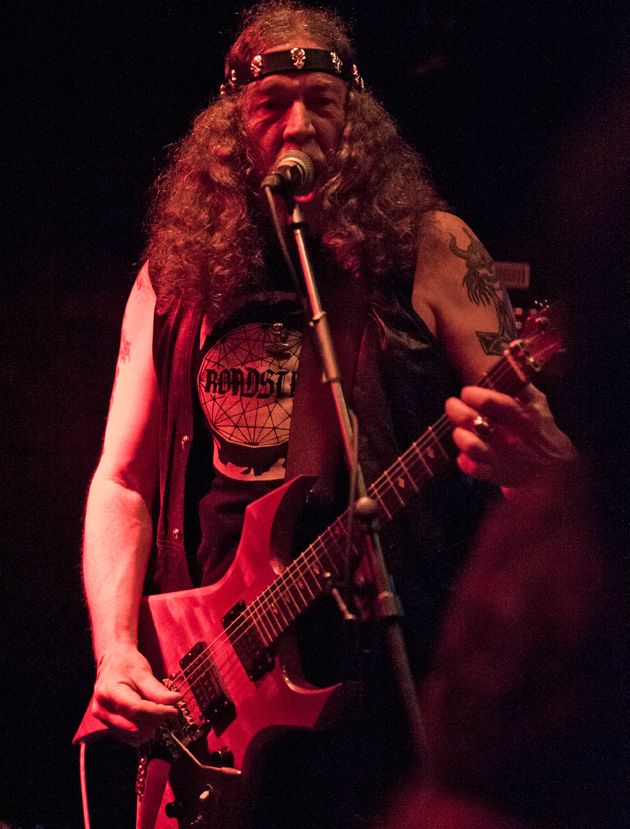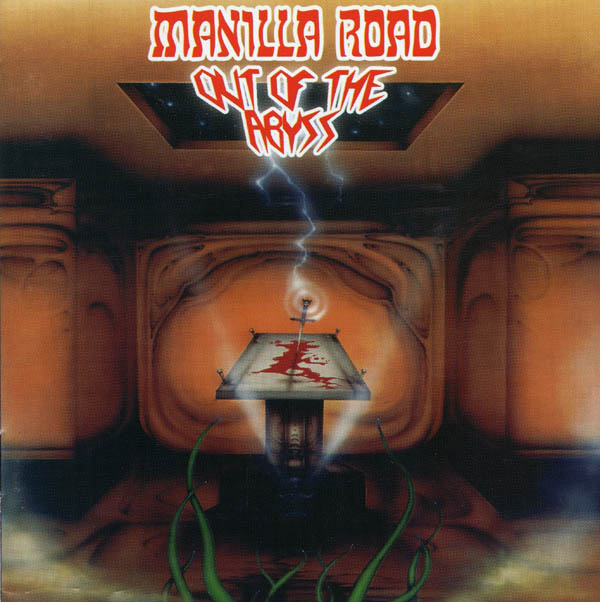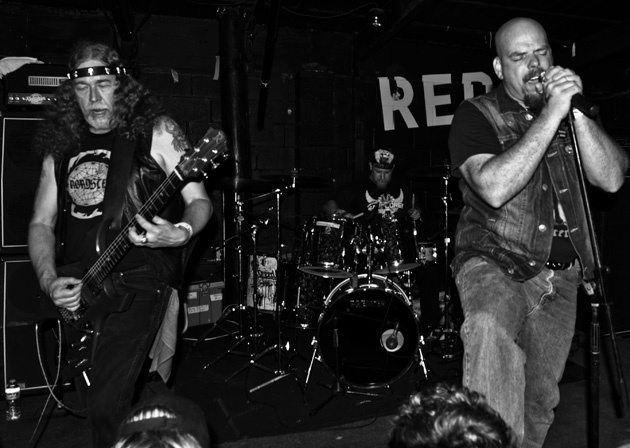Fresh off a weeklong tour that took him from Detroit to Brooklyn’s own Saint Vitus Bar, Mark “The Shark” Shelton’s voice is totally fucking trashed. “I’m still a little hoarse right now, but give it another week or two and the laryngitis will be completely gone,” he tells us over the phone from his home in Wichita, Kansas. “I do this to myself every once in a while because of how much we tour these days.”They’ve been around since 1977, but heavy metal heroes Manilla Road have never been as popular as they’ve become in the last few years. As the band’s co-founder, vocalist/guitarist/lyricist and only remaining original member, Shelton has been keeping his epic metal dreams alive over the course of an astonishing 17-album career that started out in the shit-kicker bars of central Kansas and has since spread to the festival stages of Europe, South America and beyond. Despite his mangled larynx, our man was kind enough to take us on a stroll down memory lane—through his brief stint in the Marines, the early DIY days of Manilla Road, and the making of 1983’s Crystal Logic, one of heavy metal’s long-unheralded masterpieces.
Mark Shelton: It’s sort of a family tradition. My father was a colonel in the Air Force, and most of my male family elders had been in one form of the service or another. My dad was pretty upset that I joined the Marine Corps. He said, “Well, I guess you can still be a pilot in the Marines.” And I said, “No, I’m keeping both of my feet on the ground.” [Laughs] I had my fill of planes flying around with him when I was young, so I went into the infantry. That was 1975, maybe the first part of ’76.Right after Vietnam. The Marine Corps must’ve been a strange environment at that time.
It was interesting for sure. I was in the Marines between ’Nam and the Falklands War, so I never saw any wartime myself. But I did an awful lot of training that was pretty excruciating. I got out in ’77 on a medical discharge after tearing up my left knee pretty bad, but being in the service definitely gave me some mental tools that I’ve used throughout my whole life. That’s where I learned the phrase, “Adapt, improvise and overcome,” and it sort of became my own code of living for how to actually achieve things and not let things go by the wayside because it seems like it’s too difficult. So the Marine Corp was actually important to me in developing my mental demeanor towards life. And it wasn’t long after I got out that Manilla Road started. Manilla Road at Chaos in Tejas 2012 (photo by Fred Pessaro)One of the most unique aspects of Manilla Road is your singing voice, which is instantly recognizable. How did you develop it?
Manilla Road at Chaos in Tejas 2012 (photo by Fred Pessaro)One of the most unique aspects of Manilla Road is your singing voice, which is instantly recognizable. How did you develop it?
When I was a toddler, my mom says I’d just run around in the backyard singing. And I remember laying down in the yard looking up at the stars and making up songs, so I guess I just had a natural knack for it. But my mother was a professor of music, so I was put in front of a piano with instructors at the age of four or five. By the time I was in school, I’d already had vocal lessons. I ended up in the school choirs all the time. I even ended up as a soloist in the state school choir at one point and toured all around Kansas. Back then I sounded like a Vienna choirboy. I had a really high soprano voice. That rapidly came to a stop when I reached puberty, but I was fine with that. [Laughs] I was tired of doing that choir shit, anyway. At that point I was learning to play instruments.What was the rock scene like in Wichita when Manilla Road started out?
We were the only band playing what I’d consider true heavy metal. Everybody else in the era was edging toward metal at times, but it was still what I’d consider hard rock or just heavy rock n’ roll. There weren’t any other true heavy metal bands that came out of this area until a band called Dead Orchestra followed in our footsteps out of Wichita. They were really hardcore, too—almost like thrash metal. For most purposes, they were heavier than Manilla Road. But I think we were the first metal band out of the area. The club scene here was good, but really erratic. Club owners here in Wichita—and I’m talking about over the last 40 years—haven’t really figured out a way to run a club and make it profitable. There’s always a problem—too many partners, somebody’s fingers in the till, they’re dealing drugs out of the back room. There’s always something that brings the death of the club around here.How did the club situation affect you guys back then?
Well, it was cool in a sense because you always had a new place to play. [Laughs] Back in the old days when it was me and [bassist] Scott Park and [drummer] Rick Fisher, we played almost every little town in Kansas. We played in Oklahoma and Colorado and Nebraska a little bit. But every town in Kansas had a little club or bar, and we played all of ’em. It wasn’t always successful, either. Sometimes we’d end up with a bunch of goat-ropers in front of us who only wanted to hear Willie Nelson or Lynyrd Skynyrd, and we didn’t do that shit. [Laughs] I remember getting paid to stop playing a few times. Really?
Really?
Yeah. And this was here in Wichita, too. We’d had some airplay on the local hard rock station, so they paid us pretty good to come in and play this place. We were supposed to do three 45-minute sets, but after our first one the owner of the club came over to me and said, “Look, I know you guys are probably really good in some circles, but you’re not our style at all. So here’s the money for the night, and I’m gonna give you $200 extra to pack up and go now.” [Laughs] It was the easiest payday we had that week. I mean, you gotta remember: Back then, this part of the country was two or three years behind what was happening on either coast.You released the first couple of Manilla Road records yourself, too.
That’s right—on Roadster Records Incorporated. It wasn’t just my label, though. Me, the other guys in the band, plus other family members and friends actually got together and started a Subchapter S corporation. The whole reason behind it was to put Manilla Road music out because we couldn’t find a deal with another label at the time. So we did it ourselves.And you were actually able to get your songs on the radio?
There was enough of us working together that we had a few PR ideas. We were known as the loudest, most aggressive band in the area—and we probably were at the time. The people who were really into heavy rock music weren’t getting much around here, so every time we’d play they’d all come out of the woodwork to see us. We had a reputation for packing out the clubs and everybody having a good time. We had distribution through the whole state that we monitored ourselves, and that was back when you had an awful lot of independent record stores. You didn’t have these huge chains like Wal-Mart that were just pounding the top 40, so it was a lot easier to make inroads with distributors, magazines and local radio stations. But what really set things off for us was when we put out the song “Flaming Metal Systems” on the US Metal Volume III compilation through Mike Varney at Shrapnel Records. Manilla Road at Chaos in Tejas 2012 (photo by Fred Pessaro)That’s how I first heard Manilla Road, and I’m assuming that was the case for a lot of people.
Manilla Road at Chaos in Tejas 2012 (photo by Fred Pessaro)That’s how I first heard Manilla Road, and I’m assuming that was the case for a lot of people.
I think that was the big door-opener for us as far as letting people know that Manilla Road was alive. And we put out Crystal Logic right after that. So Crystal Logic as an album had the advantage of coming off the US Metal compilation. And “Flaming Metal Systems” ended up being the most popular song on that compilation, as far as I remember. There were some good bands on that compilation, though—The Rods, Vicious Rumors—it was a cool release, and we were proud to be a part of it. But I think what made our song stand out is that I wrote it specifically for that album. It wasn’t just a song we had laying around. When Varney got in touch and asked us to submit a song, I said, “Hell yeah. Gimme a couple weeks and I’ll write you one!” We were at the end of the Crystal Logic sessions, so we just went ahead and recorded “FMS” as well. That song eventually got Crystal Logic distributed in Europe, and the next thing I knew we got an award in the mail from a radio station in Holland that named Crystal Logic the best release of that year. That’s really where it all started for us.Crystal Logic seems to be the album that resonates most with fans today. Why do you think that is?
I don’t know. With our original fanbase, it’s probably because it’s the first album they really heard of ours. You know how when you find a band you like you end up with a sort of special attachment to the first album you hear by them? For me, the first time I heard Judas Priest was the Sin After Sin album, and I’ve always had a really special attachment to that one, even though they’ve done really remarkable stuff before and after. But even nowadays, because of the reputation that Crystal Logic has, it’s the one that a lot of newer fans hear first, too. If you go on YouTube and look up a band, you tend to go to the one that has the most views because you figure, “Oh, this must be a good one because everybody’s watching it.” Songs like “Crystal Logic” and “Necropolis” seem to be the most popular off that album, so they’re often the ones people check out first. I guess they just have that really catchy hook that people remember. In terms of the attention it gets, it’s probably the most important album we’ve ever done. If I was a real rock n’ roll asshole, I’d probably be trying to duplicate that album over and over again. But that’s not me.
Oh, I still feel that way. It’s tainted for me because of Mark Mauser, the producer. It’s the only time we’ve ever actually used a producer. I think he was really important as far as helping us achieve the sounds we were looking for in the studio, but at the same time he’s the one that talked me into writing a song for airplay. It was the last time I let anybody do that. [Laughs] I mean, I actually wrote “Hey, baby” in a song. I still can’t believe I did that! Are you kidding me? It’s like my worst nightmare as an artistic musician to have my gravestone read, “Here lies Mark Shelton, the guy who wrote ‘Hey baby’ in a song.” I just totally detest that.Usually your lyrics reference mythology, Arthurian legend or Robert E. Howard type of stuff.
I’ve always been on a mission to prove that metal can be artistic and literate. And of course since we deemed ourselves “epic metal,” we could do anything we wanted with it as long as it’s epic. But I’ve always wanted our lyrics to be intelligent. It doesn’t just have to be about sex, drugs and rock n’ roll, no matter how much we like that stuff.J. Bennett thinks you should listen to Crystal Logic immediately, if not sooner.Manilla Road’s 17th (!) studio album, The Blessed Curse, is out on February 13th.
Advertisement
Noisey: You started playing in bands in high school, but then joined the Marines after graduation and before you started Manilla Road. Why the military detour?
Mark Shelton: It’s sort of a family tradition. My father was a colonel in the Air Force, and most of my male family elders had been in one form of the service or another. My dad was pretty upset that I joined the Marine Corps. He said, “Well, I guess you can still be a pilot in the Marines.” And I said, “No, I’m keeping both of my feet on the ground.” [Laughs] I had my fill of planes flying around with him when I was young, so I went into the infantry. That was 1975, maybe the first part of ’76.Right after Vietnam. The Marine Corps must’ve been a strange environment at that time.
It was interesting for sure. I was in the Marines between ’Nam and the Falklands War, so I never saw any wartime myself. But I did an awful lot of training that was pretty excruciating. I got out in ’77 on a medical discharge after tearing up my left knee pretty bad, but being in the service definitely gave me some mental tools that I’ve used throughout my whole life. That’s where I learned the phrase, “Adapt, improvise and overcome,” and it sort of became my own code of living for how to actually achieve things and not let things go by the wayside because it seems like it’s too difficult. So the Marine Corp was actually important to me in developing my mental demeanor towards life. And it wasn’t long after I got out that Manilla Road started.
Advertisement

When I was a toddler, my mom says I’d just run around in the backyard singing. And I remember laying down in the yard looking up at the stars and making up songs, so I guess I just had a natural knack for it. But my mother was a professor of music, so I was put in front of a piano with instructors at the age of four or five. By the time I was in school, I’d already had vocal lessons. I ended up in the school choirs all the time. I even ended up as a soloist in the state school choir at one point and toured all around Kansas. Back then I sounded like a Vienna choirboy. I had a really high soprano voice. That rapidly came to a stop when I reached puberty, but I was fine with that. [Laughs] I was tired of doing that choir shit, anyway. At that point I was learning to play instruments.What was the rock scene like in Wichita when Manilla Road started out?
We were the only band playing what I’d consider true heavy metal. Everybody else in the era was edging toward metal at times, but it was still what I’d consider hard rock or just heavy rock n’ roll. There weren’t any other true heavy metal bands that came out of this area until a band called Dead Orchestra followed in our footsteps out of Wichita. They were really hardcore, too—almost like thrash metal. For most purposes, they were heavier than Manilla Road. But I think we were the first metal band out of the area. The club scene here was good, but really erratic. Club owners here in Wichita—and I’m talking about over the last 40 years—haven’t really figured out a way to run a club and make it profitable. There’s always a problem—too many partners, somebody’s fingers in the till, they’re dealing drugs out of the back room. There’s always something that brings the death of the club around here.
Advertisement
Well, it was cool in a sense because you always had a new place to play. [Laughs] Back in the old days when it was me and [bassist] Scott Park and [drummer] Rick Fisher, we played almost every little town in Kansas. We played in Oklahoma and Colorado and Nebraska a little bit. But every town in Kansas had a little club or bar, and we played all of ’em. It wasn’t always successful, either. Sometimes we’d end up with a bunch of goat-ropers in front of us who only wanted to hear Willie Nelson or Lynyrd Skynyrd, and we didn’t do that shit. [Laughs] I remember getting paid to stop playing a few times.

Yeah. And this was here in Wichita, too. We’d had some airplay on the local hard rock station, so they paid us pretty good to come in and play this place. We were supposed to do three 45-minute sets, but after our first one the owner of the club came over to me and said, “Look, I know you guys are probably really good in some circles, but you’re not our style at all. So here’s the money for the night, and I’m gonna give you $200 extra to pack up and go now.” [Laughs] It was the easiest payday we had that week. I mean, you gotta remember: Back then, this part of the country was two or three years behind what was happening on either coast.You released the first couple of Manilla Road records yourself, too.
That’s right—on Roadster Records Incorporated. It wasn’t just my label, though. Me, the other guys in the band, plus other family members and friends actually got together and started a Subchapter S corporation. The whole reason behind it was to put Manilla Road music out because we couldn’t find a deal with another label at the time. So we did it ourselves.
Advertisement
There was enough of us working together that we had a few PR ideas. We were known as the loudest, most aggressive band in the area—and we probably were at the time. The people who were really into heavy rock music weren’t getting much around here, so every time we’d play they’d all come out of the woodwork to see us. We had a reputation for packing out the clubs and everybody having a good time. We had distribution through the whole state that we monitored ourselves, and that was back when you had an awful lot of independent record stores. You didn’t have these huge chains like Wal-Mart that were just pounding the top 40, so it was a lot easier to make inroads with distributors, magazines and local radio stations. But what really set things off for us was when we put out the song “Flaming Metal Systems” on the US Metal Volume III compilation through Mike Varney at Shrapnel Records.

I think that was the big door-opener for us as far as letting people know that Manilla Road was alive. And we put out Crystal Logic right after that. So Crystal Logic as an album had the advantage of coming off the US Metal compilation. And “Flaming Metal Systems” ended up being the most popular song on that compilation, as far as I remember. There were some good bands on that compilation, though—The Rods, Vicious Rumors—it was a cool release, and we were proud to be a part of it. But I think what made our song stand out is that I wrote it specifically for that album. It wasn’t just a song we had laying around. When Varney got in touch and asked us to submit a song, I said, “Hell yeah. Gimme a couple weeks and I’ll write you one!” We were at the end of the Crystal Logic sessions, so we just went ahead and recorded “FMS” as well. That song eventually got Crystal Logic distributed in Europe, and the next thing I knew we got an award in the mail from a radio station in Holland that named Crystal Logic the best release of that year. That’s really where it all started for us.
Advertisement
I don’t know. With our original fanbase, it’s probably because it’s the first album they really heard of ours. You know how when you find a band you like you end up with a sort of special attachment to the first album you hear by them? For me, the first time I heard Judas Priest was the Sin After Sin album, and I’ve always had a really special attachment to that one, even though they’ve done really remarkable stuff before and after. But even nowadays, because of the reputation that Crystal Logic has, it’s the one that a lot of newer fans hear first, too. If you go on YouTube and look up a band, you tend to go to the one that has the most views because you figure, “Oh, this must be a good one because everybody’s watching it.” Songs like “Crystal Logic” and “Necropolis” seem to be the most popular off that album, so they’re often the ones people check out first. I guess they just have that really catchy hook that people remember. In terms of the attention it gets, it’s probably the most important album we’ve ever done. If I was a real rock n’ roll asshole, I’d probably be trying to duplicate that album over and over again. But that’s not me.
In the past you’ve said you felt that Crystal Logic was tainted because of the song “Feeling Free Again.”
Oh, I still feel that way. It’s tainted for me because of Mark Mauser, the producer. It’s the only time we’ve ever actually used a producer. I think he was really important as far as helping us achieve the sounds we were looking for in the studio, but at the same time he’s the one that talked me into writing a song for airplay. It was the last time I let anybody do that. [Laughs] I mean, I actually wrote “Hey, baby” in a song. I still can’t believe I did that! Are you kidding me? It’s like my worst nightmare as an artistic musician to have my gravestone read, “Here lies Mark Shelton, the guy who wrote ‘Hey baby’ in a song.” I just totally detest that.Usually your lyrics reference mythology, Arthurian legend or Robert E. Howard type of stuff.
I’ve always been on a mission to prove that metal can be artistic and literate. And of course since we deemed ourselves “epic metal,” we could do anything we wanted with it as long as it’s epic. But I’ve always wanted our lyrics to be intelligent. It doesn’t just have to be about sex, drugs and rock n’ roll, no matter how much we like that stuff.J. Bennett thinks you should listen to Crystal Logic immediately, if not sooner.Manilla Road’s 17th (!) studio album, The Blessed Curse, is out on February 13th.
